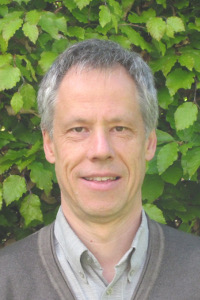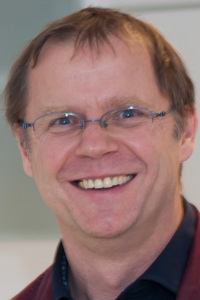Program
Monday, February 17, 2020
09:00 - 09:15: Opening Session |
09:15 - 10:15: Keynote Talk Jan Van den Bussche: First-order logic of information flows: expressibility, primitivity, input-output properties, and limited access patterns |
10:15 - 10:45: Coffee Break |
10:45 - 12:15: Session "Knowledge Representation and Automated Reasoning 1" Stipe Pandzic: On the dynamics of structured argumentation: Modeling changes in default justification logic Wolfgang Dvorák, Anna Rapberger, Johannes P. Wallner and Stefan Woltran: ASPARTIX-V19 - An Answer-set Programming based System for Abstract Argumentation (short talk) |
12:15 - 13:45: Lunch Break |
13:45 - 15:15: Session "Distributed and Parallel Databases, Distributed Knowledge 1" Klaus-Dieter Schewe, Yamine Ait Ameur and Sarah Benyagoub: Realisability of Choreographies Daniel Xia, Michael Simpson, Venkatesh Srinivasan and Alex Thomo: Strongly Minimal MapReduce Algorithms: A TeraSort Case Study (short talk) |
15:15 - 15:45: Coffee Break |
15:45 - 17:45: Session "Databases, Dependencies, and Dependence Logic 1" Robert Brijder, Marc Gyssens and Jan Van den Bussche: On matrices and K-relations Munqath Al-Atar and Attila Sali: Functional Dependencies in Incomplete Databases With Limited Domains (short talk) Bernhard Thalheim: Schema Optimisation Instead Of (Local) Normalisation (short talk) |
Tuesday, February 18, 2020
09:00 - 10:00: Keynote Talk Bernhard Nebel: Implicit coordination of mobile agents |
10:00 - 10:30: Coffee Break |
10:30 - 12:30: Session "Databases, Dependencies, and Dependence Logic 2" Yasir Mahmood and Arne Meier: Parameterised Complexity of Model Checking and Satisfiability in Propositional Dependence Logic Pietro Galliani and Jouko Vaananen: Diversity, dependence and independence |
12:30 - 14:00: Lunch Break |
14:00 - 15:30: Session "Interaction between Multiple Agents" Yuri David Santos: Social Consolidations: Rational Belief in a Many-Valued Logic of Evidence and Peerhood Munyque Mittelmann and Laurent Perrussel: Game Description Logic with Integers: A GDL Numerical Extension (short talk) |
15:30 - 16:00: Coffee Break |
16:00 - 18:00: Session "Knowledge Representation and Automated Reasoning 2" Silvia Ghilezan, Jelena Ivetic, Simona Kasterovic, Zoran Ognjanovic and Nenad Savic: Towards probabilistic reasoning in type theory - the intersection type case Christoph Beierle and Jonas Haldimann: Normal Forms of Conditional Knowledge Bases Respecting Entailments and Renamings |
18:00: FoIKS Steering Committee Meeting (open to everyone) |
Wednesday, February 19, 2020
09:00 - 10:00: Keynote Talk (EurAI Talk) Anni-Yasmin Turhan: Description Logics for Typicality and Nonmonotonic Reasoning |
10:00 - 10:30: Coffee Break |
10:30 - 12:30: Session "Ontologies and Applications" Xianglin Zhan, Cai Lu and Guangmin Hu: Event Sequence Interpretation of Structural Geomodels: A Knowledge-Based Approach for Extracting Tectonic Sequences Dennis Medved, Johan Nilsson and Pierre Nugues: Utilizing Deep Learning and RDF to Predict Heart Transplantation Survival |
12:30 - 14:00: Lunch Break |
14:00: Social Event and Conference Dinner |
Thursday, February 20, 2020
09:00 - 10:00: Keynote Talk Klaus-Dieter Schewe: Computation on structures - behavioural theory, logic and complexity |
10:00 - 10:30: Coffee Break |
10:30 - 12:30: Session "Distributed and Parallel Databases, Distributed Knowledge 2" Elena Ravve: Logic-based Approach to Incremental Monitoring and Optimization on Strongly Distributed Data Streams Ryo Murai and Katsuhiko Sano: Craig Interpolation of Epistemic Logics with Distributed Knowledge |
12:30 - 14:00: Lunch Break |
14:00 - 15:30: Session "Inconsistency and Complexity" John Grant and Francesco Parisi: Measuring Inconsistency in a General Information Space Flavio Ferrarotti, Senén González, Klaus-Dieter Schewe and Jose Turull-Torres: Proper Hierarchies in Polylogarithmic Time and Absence of Complete Problems (short talk) |
15:30 - 16:00: Closing and Coffee |
Social Event and Conference Dinner
The social event takes us to the Zollern Colliery which is located in the west of Dortmund. It is one of the most beautiful and impressive testimonies to Germany's industrial history. It was closed down in 1966 and serves as the headquarters of the Westphalian Industrial Museum now. We join a guided tour in English at 3:30 p.m. but there is also some time to inspect the museum on your own.
The conference dinner takes place at HÖVELS Hausbrauerei in the city of Dortmund. We have arranged
a tour of the HÖVELS in-house brewery at 6 p.m. right before the dinner, too.
Accepted Papers
- Wolfgang Dvořák, Anna Rapberger, Johannes P. Wallner and Stefan Woltran: ASPARTIX-V19 - An Answer-set Programming based System for Abstract Argumentation
- Robert Brijder, Marc Gyssens and Jan Van den Bussche: On matrices and K-relations
- Stipe Pandžić: On the dynamics of structured argumentation: Modeling changes in default justification logic
- Pietro Galliani and Jouko Vaananen: Diversity, dependence and independence
- Ryo Murai and Katsuhiko Sano: Craig Interpolation of Epistemic Logics with Distributed Knowledge
- John Grant and Francesco Parisi: Measuring Inconsistency in a General Information Space
- Klaus-Dieter Schewe, Yamine Ait Ameur and Sarah Benyagoub: Realisability of Choreographies
- Yasir Mahmood and Arne Meier: Parameterised Complexity of Model Checking and Satisfiability in Propositional Dependence Logic
- Elena Ravve: Logic-based Approach to Incremental Monitoring and Optimization on Strongly Distributed Data Streams
- Christoph Beierle and Jonas Haldimann: Normal Forms of Conditional Knowledge Bases Respecting Entailments and Renamings
- Munyque Mittelmann and Laurent Perrussel: Game Description Logic with Integers: A GDL Numerical Extension
- Yuri David Santos: Social Consolidations: Rational Belief in a Many-Valued Logic of Evidence and Peerhood
- Dennis Medved, Johan Nilsson and Pierre Nugues: Utilizing Deep Learning and RDF to Predict Heart Transplantation Survival
- Silvia Ghilezan, Jelena Ivetić, Simona Kašterović, Zoran Ognjanović and Nenad Savić: Towards probabilistic reasoning in type theory - the intersection type case
- Xianglin Zhan, Cai Lu and Guangmin Hu: Event Sequence Interpretation of Structural Geomodels: A Knowledge-Based Approach for Extracting Tectonic Sequences
- Bernhard Thalheim: Schema Optimisation Instead Of (Local) Normalisation
- Munqath Al-Atar and Attila Sali: Functional Dependencies in Incomplete Databases With Limited Domains
- Flavio Ferrarotti, Senén González, Klaus-Dieter Schewe and Jose Turull-Torres: Proper Hierarchies in Polylogarithmic Time and Absence of Complete Problems
- Daniel Xia, Michael Simpson, Venkatesh Srinivasan and Alex Thomo: Strongly Minimal MapReduce Algorithms: A TeraSort Case Study
Keynotes

Jan Van den Bussche
The logic of information flows has been proposed by Ternovska as a general framework in the field of knowledge representation. The general aim of LIF is to model how information propagates in complex systems. In this work, we focus on the first-order version of LIF. Unique to LIF is the dynamic semantics which relates input assignments to output assignments. We formulate semantic definitions of input and output variables of a LIF expression. These semantic definitions are then approximated by syntactic definitions. The expressive power of LIF is compared to that of first-order logic (FO), and bounded-variable fragments of FO. In this setting, we investigate the primitivity of the composition operator in LIF. We also introduce the "forward" fragment of LIF and show how it can offer a fresh, navigational, perspective on querying information sources with limited access patterns.

Bernhard Nebel
In multi-agent path finding (MAPF), it is usually assumed that planning is performed centrally and that the destinations of the agents are common knowledge. We will drop both assumptions and analyze under which conditions it can be guaranteed that the agents reach their respective destinations using implicitly coordinated plans without communication. Furthermore, we will analyze what the computational costs associated with such a coordination regime are. As it turns out, guarantees can be given assuming that the agents are of a certain type. However, the implied computational costs are quite severe. The plan existence problem becomes PSPACE-complete, while the original MAPF plan existence problem is in P. This clearly demonstrates the value of communicating about plans before execution starts.

Klaus-Dieter Schewe
Database theory is closely linked to finite model theory. Each relational database defines a finite relational structure, and queries as well as database transformations are computations on these structures. Furthermore, descriptive complexity theory provides many links between the expressiveness of logics concerning queries and common space/time complexity classes. Examples are the celebrated results by Fagin concerning the capture of NP by existential second-order logic and by Immerman/Vardi concerning the capture of PTIME by first-order logic plus inflationary fixed-point over ordered structures. Another related development is provided by behavioural theories of classes of algorithms and proofs that these are captured by variants of abstract state machines, which operate on isomorphism classes of structures. Such theories with purely logical definitions of classes of computations of interest have been developed for sequential, parallel, concurrent and reflective algorithms. Therefore, we will argue for a shift of paradigm making computations on structures as provided by abstract state machines the standard model of computation with the advantage that computations on arbitrary levels of abstraction are enabled. Behavioural theories provide the means for logical characterisation of classes of computations, and also the logical characterisation of complexity in connection with the capture of complexity classes by specific classes of abstract state machines seems possible and adequate. We will provide evidence for the rationale of this shift.

Anni-Yasmin Turhan
Description Logics (DLs) are an intensively studied class of logics tailored towards building ontologies. Most DLs are decidable fragments of first-order logic. A DL knowledge base consists of two parts: the terminological part that captures the concepts of the application at hand by means of concept axioms and of the assertional part that captures the data from the application. In practical applications where exceptions occur frequently, such as Biology or Medicine, classical, monotone reasoning is often undesirable. Likewise, for applications where data may be erroneous and causes inconsistencies w.r.t. the DL terminology, monotonic reasoning is unsuitable. An approach to achieve nonmonotonic behaviour of DLs is to employ defeasible description logics, which admit the use of defeasible concept axioms. During reasoning these axioms can be omitted for those instances that otherwise would cause an inconsistency. Defeasible DLs can also be employed to model typicality. Instances that fulfill more defeasible axioms are simply regarded more typical than others. Over the last decade a whole range of defeasible DLs has been proposed in the literature. The proposals have very different strengths and weaknesses and can be rather hard to compare with each other - in particular, as the semantics are often given in a procedural way. In this talk I introduce defeasible DLs and demonstrate different approaches to reasoning in these DLs. I discuss our recent approach for the defeasible Description Logic EL_\bot that has model-theoretic semantics and remedies some of the severe shortcomings of earlier approaches. We also investigate the complexity of reasoning in this defeasible DL in different settings.